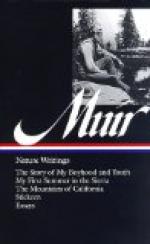We seldom saw deer, though their tracks were common. The Yankee explained that they traveled and fed mostly at night, and hid in tamarack swamps and brushy places in the daytime, and how the Indians knew all about them and could find them whenever they were hungry.
Indians belonging to the Menominee and Winnebago tribes occasionally visited us at our cabin to get a piece of bread or some matches, or to sharpen their knives on our grindstone, and we boys watched them closely to see that they didn’t steal Jack. We wondered at their knowledge of animals when we saw them go direct to trees on our farm, chop holes in them with their tomahawks and take out coons, of the existence of which we had never noticed the slightest trace. In winter, after the first snow, we frequently saw three or four Indians hunting deer in company, running like hounds on the fresh, exciting tracks. The escape of the deer from these noiseless, tireless hunters was said to be well-nigh impossible; they were followed to the death.
Most of our neighbors brought some sort of gun from the old country, but seldom took time to hunt, even after the first hard work of fencing and clearing was over, except to shoot a duck or prairie chicken now and then that happened to come in their way. It was only the less industrious American settlers who left their work to go far a-hunting. Two or three of our most enterprising American neighbors went off every fall with their teams to the pine regions and cranberry marshes in the northern part of the State to hunt and gather berries. I well remember seeing their wagons loaded with game when they returned from a successful hunt. Their loads consisted usually of half a dozen deer or more, one or two black bears, and fifteen or twenty bushels of cranberries; all solidly frozen. Part of both the berries and meat was usually sold in Portage; the balance furnished their families with abundance of venison, bear grease, and pies.
Winter wheat is sown in the fall, and when it is a month or so old the deer, like the wild geese, are very fond of it, especially since other kinds of food are then becoming scarce. One of our neighbors across the Fox River killed a large number, some thirty or forty, on a small patch of wheat, simply by lying in wait for them every night. Our wheat-field was the first that was sown in the neighborhood. The deer soon found it and came in every night to feast, but it was eight or nine years before we ever disturbed them. David then killed one deer, the only one killed by any of our family. He went out shortly after sundown at the time of full moon to one of our wheat-fields, carrying a double-barreled shotgun loaded with buckshot. After lying in wait an hour or so, he saw a doe and her fawn jump the fence and come cautiously into the wheat. After they were within sixty or seventy yards of him, he was surprised when he tried to take aim that about half of the moon’s disc was mysteriously darkened




